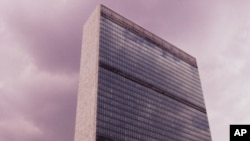A new United Nations study says secret detentions violate International Human Rights Law. It says such practices cannot be justified under any circumstances. The 226-page study was conducted by independent U.N. experts on counter-terrorism, torture, arbitrary detention and involuntary disappearances.
The study analyzes secret detention practices prior to the 9/11 terrorist attacks in the United States, but it mostly dwells on secret detention practices over the past nine years of the so-called Global War on Terror.
The report cites the United States among dozens of countries that have captured and held terror suspects in detention. Other countries accused of detaining security suspects or opposition members in secret places include Algeria, China, Egypt, India, Iran, Russia, Sudan and Zimbabwe.
The investigators are critical of the Guantanamo Bay detention center as well as so-called black sites set up to keep al-Qaida terror suspects beyond the reach of domestic courts.
They say the CIA established its own secret detention facilities to interrogate so-called High Value Detainees. And after the start of the conflicts in Afghanistan and Iraq, the U.N. experts say detainees were held incommunicado and deprived of basic rights to trial, a lawyer and contacts with their families.
The study does not just point an accusatory finger at the United States. It finds countries in almost all regions of the world secretly detain people suspected of terrorism.
It says secret detention should be explicitly prohibited and in times of armed conflict, it says the location of all detention facilities should be disclosed to the International Committee of the Red Cross (ICRC).
The Geneva-based ICRC did not participate in the study and has not commented on its content. However, the agency has repeatedly expressed concern about secret detention facilities.
ICRC spokeswoman, Carla Haddad Mardini tells VOA the Red Cross believes any type of secret detention is contrary to international law. She says any person whose whereabouts are unknown is extremely vulnerable.
"We firmly believe that no matter how legitimate the grounds for detaining someone there exists no right to conceal the person's whereabouts," she said. "It is very important to know the whereabouts of someone who is detained so the International Committee of the Red Cross can assess the conditions of detention and treatment and facilitate the exchange of family news between the person detained and the relatives who are concerned about the safety and the well being of the person."
Haddad Mardini says the ICRC welcomes the intention of the U.S. government to inform the agency of all detainees being held by the U.S. in any armed conflict.
The U.N. investigators also welcome commitments by the Obama Administration to close CIA detention facilities, but they say they would like clarification about what has happened to people held in CIA sites in Iraq or Afghanistan.
The U.N. study says many U.S.-captured suspects were transferred by the Central Intelligence Agency to other countries such as Ethiopia, Djibouti, Egypt, Jordan, Morocco, Pakistan and Syria. It says they were held in proxy detention sites for interrogation.
It heavily criticizes the practice of extraordinary rendition and says detainees apparently were sent to allies including Thailand, Poland and Romania.
The investigators say some former detainees they interviewed said they had been subjected to torture and ill-treatment during their period of detention.
UN: Secret Detention Violates International Humanitarian Law
- By Lisa Schlein




